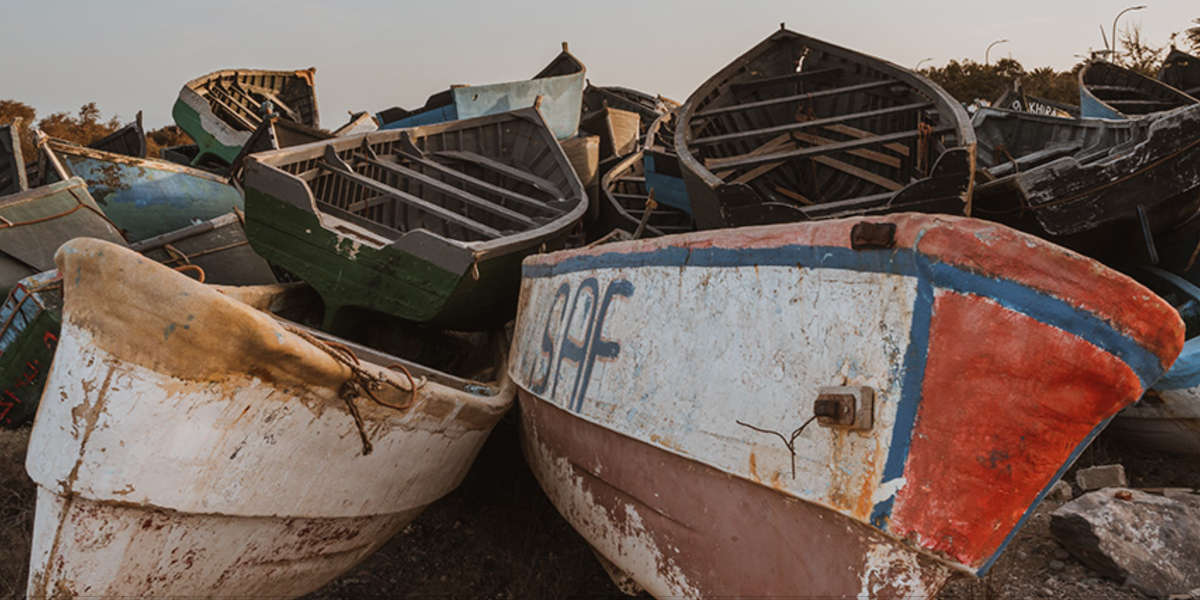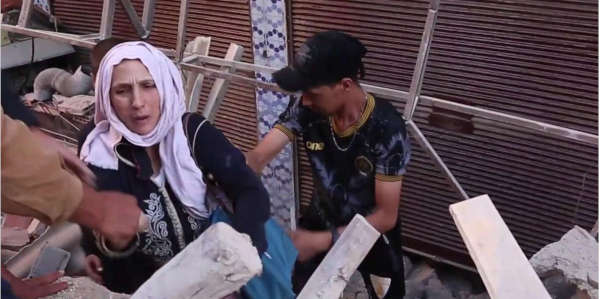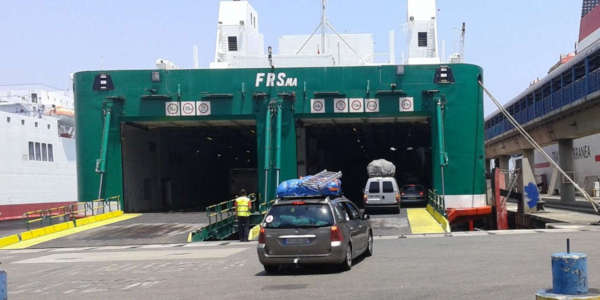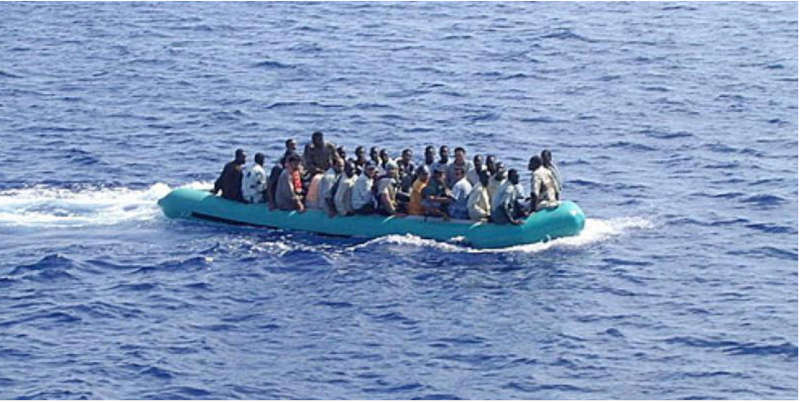In the picture
Boats used by migrants abandoned on the coast of Arinaga, in the Canary Islands [Comisión Española de financial aid al Refugiado © José Luis Rodríguez Sierra].
MARCH 2024
meeting in Algiers of the Forum of Gas Exporting Countries to stabilize the price of gas.
March 3-The forum of gas exporting countries has brought together in Algiers the states with 70% of the reserves of this hydrocarbon. The main goal of the summit was to stabilize the price of natural gas, which has fluctuated between 30 and 50 dollars per megawatt/hour after reaching a high of 200 dollars following the outbreak of the war in Ukraine.
Mauritania receives 210 million euros from the EU to curb immigration
March 7-Mauritania's interior minister, Mohamed Ahmed, and EU interior commissioner, Iylva Johansson, have signed a agreement granting the Maghreb country 210 million euros to become a buffer for sub-Saharan immigration. In addition, European Union countries such as Spain have pledged to provide training to law enforcement agencies in charge of curbing illegal immigration. Mauritania is the main departure point for canoes arriving in the Canary Islands. This together with the instability in neighboring Senegal and the numerous coups d'état in the Sahel make Mauritania a point core topic to stop this new migratory crisis.
Algeria's reaction to the seizure of its embassy grounds in Rabat
March 17-Morocco has decided to confiscate the land on which the Algerian embassy in Rabat is located under the pretext of an "extension of the grounds of the Ministry of Foreign Affairs". The Algerian government has expressed its strong dissatisfaction by publishing a statement stating that this is "yet another provocation on the part of the Moroccan government" and a violation of the Vienna Convention. These events are an alleged response to the opening of an office in Algiers by a political party seeking the independence of the Moroccan Rif region.
4 people in Tunisia sentenced to death on charges of killing opposition leader in 2013
March 27-After 8 years of judicial proceedings, a court of first written request in Tunisia has decreed capital punishment for 4 of those accused in the 2013 assassination of leftist leader Belaid. The death of the opposition leader was claimed at the time by the Islamic State. The sentence has been particularly harsh as it is a terrorism offense. The North African country is in a difficult moment, with a very unstable economic status , illegal immigration and street protests.
Moroccan military maneuvers off Western Sahara set off alarm bells in Spain
March 29-Rabat has announced the start of 3 months of naval maneuvers off the coast of Western Sahara. These maneuvers are assumed to be a reaffirmation of Moroccan control over that territory. The Canary Islands regional government , presided by Fernando Clavijo, has raised its voice against military maneuvers to be carried out only 125 kilometers from the island of Fuerteventura. The Spanish Minister of Foreign Affairs, José Manuel Albares, has nevertheless come out to reassure these concerns by affirming that these maneuvers had been warned and do not pose any danger to the territorial integrity of the Canary Islands. In addition to sending a message of strength, the maneuvers are a response to the judicial setback from Europe on the fisheries agreement between Morocco and the EU for 2019. The agreement is in question because it does not take into account the self-determination of the Saharawi territory. These maneuvers join the already multiple clashes between the Spanish and Moroccan governments on issues such as immigration, the opening of customs in Ceuta and Melilla and the delimitation of the Canary territorial waters between Spain and Morocco.
FEBRUARY 2024
European Union agrees to 210 million euros in aid for Mauritania
February 8-The European Commission has finalized an agreement agreement with Mauritania for the provision of 210 million euros to the African country, with the main objective goal to encourage the government to combat the flow of irregular migration from sub-Saharan African countries. The flow through the migratory route that starts from the coast of Mauritania and ends in the Canary Islands has increased notably in the last year.
Spanish Foreign Minister cancels his visit to Algiers at the last minute
February 11-Following the extended diplomatic crisis between Algeria and Spain that has seen trade ties between the two countries effectively disappear since 2022, the meeting between their foreign ministers has been postponed indefinitely at Algeria's request. The cancellation of the meeting has taken by surprise the head of the Spanish diplomacy, who was a few hours away from making the trip to Algiers when he was informed of the news. The postponement of this meeting complicates the reconciliation between the two nations.
Morocco announces largest interception of irregular migrants of the year
February 19-The Moroccan Navy has announced the interception of a vessel with 141 on board heading for the Canary Islands. This interception of irregular migrants, carried out in the territorial waters of Western Sahara, would be the largest made by the Maghreb country this year, when maritime migratory routes from Mauritania and sub-Saharan Africa to the Canary Islands have intensified.
Sanchez highlights in Rabat the good relations between Spain and Morocco
February 21-The Spanish Prime Minister met with King Mohammed VI in Rabat. Sánchez has highlighted the intense relationship between the two countries following the agreement of the Roadmap in 2022, which established a substantial increase in economic and diplomatic cooperation. Since then, Spain's economic investments in Moroccan infrastructure projects have reached over 20 billion euros annually. The meeting addressed issues such as the organization of the 2030 Football World Cup between Spain, Portugal and Morocco; the fight against terrorism; and irregular migration in the region.
Morocco maintains its position on the closure of customs offices in Ceuta and Melilla
February 21-In his visit to Rabat, the head of the Spanish government has conveyed to Mohammed VI that Spain is ready for the reopening of the customs of Ceuta and Melilla. The Moroccan monarch, for his part, has stressed that certain "technical issues" remain to be resolved before confirming the reopening of customs, which Morocco closed unilaterally in 2018. It should be noted that Ceuta and Melilla, not being part of the customs territory of the European Union, are considered as external territories for such purposes.
Political repression in Algeria continues with no sign of improvement
February 22-February 22-About five years after the mass protests in Algeria that caused the resignation of President Abdelaziz Bouteflika in 2019, the status of the right to freedom of expression and political protest worsens by the day. The issue of opposition politicians, reporters and human rights defenders who have been imprisoned by the regime exceeds 1,000 people. From agreement with independent sources, more than 250 political prisoners have been released since February 2022. However, the issue of imprisoned opponents in the country continues to grow.
JANUARY 2024
Morocco intercepted 90,000 migrants seeking to go to Spain in 2023
January 3-Rabat has reported that over the course of 2023 Moroccan Army units intercepted 87,000 migrants, both on land and sea routes, heading for Spain; the majority were of sub-Saharan origin. Thanks to the intensified surveillance and control of Moroccan territorial waters, it was possible to rescue more than 20,000 people on boats sailing to the Canary Islands.
After a controversial vote, Morocco to chair the UN Human Rights committee
Jan. 10-Omar Zniber, Moroccan ambassador to the UN Human Rights committee , has been elected as the next president of this body for 2024 with 30 votes in favor, compared to 17 votes for the South African candidate ; it is the first time that position has not been appointed by consensus. Several countries opposed the Moroccan nomination, considering that the government violates human rights in Western Sahara.
Algeria resumes trade relations after the return of its ambassador to Spain
17 January- association Algerian Banks and Financial Institutions has authorized the import of poultry products, a first step towards the thawing of trade relations with Spain, broken after Madrid's support for Morocco's autonomy plan proposal for Western Sahara in June 2022.
Algeria prohibits the entrance of goods that have passed through Moroccan ports.
January 18-The Algerian government has decided to veto the entrance of products that have passed through Moroccan ports. The Alawite kingdom sees this as an attempt by Algeria to benefit Spanish ports and thus accelerate the thaw in relations between Algiers and Madrid.
The Supreme Court rules against the hot return of minors who entered Ceuta in 2021.
January 22-The Supreme Court considers that the Spanish authorities violated the agreement European Convention on Human Rights, which prohibits "collective expulsions of foreigners". Between May 17 and 18, 2021, 12,000 migrants, of whom 1,500 were unaccompanied minors, were entrance in Ceuta. The government of the autonomous city of Ceuta defended the legality of the refoulement by invoking agreement between Spain and Morocco of 2007, but the Supreme Court established that the authorities did not respect the Law on Aliens or the European Human Rights agreement .
DECEMBER 2023
Albares visit Rabat to strengthen diplomatic ties
December 14-Spanish Foreign Minister José Manuel Albares has visited Rabat with the goal to "relaunch the roadmap" agreed between Spain and Morocco in April 2022. Addressing issues such as the joint organization of the 2030 World Cup and the upcoming visit of Pedro Sanchez to Morocco, the meeting aims to strengthen diplomatic ties between the two countries in a month of critical importance for Rabat, which this month will also receive important diplomats from Niger, Mali and Burkina Faso, as well as Russian Foreign Minister Sergei Lavrov. December appears to be a turning point for Moroccan foreign policy, which sets its sights on the Sahel while strengthening its strategic diplomatic position with its Spanish neighbor.
Tunisia sample more open to cooperate with the EU
Dec. 15-Tunisia's coast guard has improved its figures for interceptions of irregular migrants heading for the European continent. The migration route from Tunisia to Italian territory has become the busiest in the Mediterranean in 2023. In September, interceptions grew by 21%, 82% in October and 54% in November.
Closure of Ceuta and Melilla customs offices continues
Dec. 18-The customs offices of the Spanish autonomous cities of Ceuta and Melilla remain closed for goods coming from Morocco. This status has been going on since 2018 when the North African country cut off the flow of goods between Morocco and both cities. The Spanish Foreign Minister, José Manuel Albares, commented in an interview recently that "everything is ready so that the customs of Ceuta and Melilla can open tomorrow." However, the Moroccan customs is not ready due to "technical problems", although Albares indicated that the status will be unblocked shortly, which will be an important boost to the Economics of the autonomous cities.
The triumvirate of cooperation in North Africa: Rabat-Abu Dhabi-Tel Aviv
Dec. 28-The year that is ending has been characterized by a marked increase in economic and military cooperation between three key players in the Arab world and the Middle East. Following the Abraham Accords in 2020, which initiated the process of normalization of relations of Morocco and the United Arab Emirates with Israel, a high level of coordination has been observed between the three countries in terms of development of both a political and economic strategy for the African continent. Military arms sales from Tel Aviv and Abu Dhabi to Rabat have increased, while all three countries benefit more and more each year from the US Foreign Military Sales program. Consequently, for their customers in the Sahel region and further south, the growing cooperation with this bloc of countries, whose military capabilities are backed by Washington, means a leap in the influence of these countries in the region, which tends to be mutually exclusive with the influence of their rivals, mainly Algeria, Russia and Iran.
Algeria continues normalization of relations with Spain
December 28-Spain and Algeria continue to take steps to reestablish full relations. According to Algerian Foreign Minister Ahmed Attaf, the turning point came after Pedro Sanchez's speech at the UN General Assembly. The minister also stated that this speech meant a return of Spain to the 'European position' which is based on seeking a solution in 'the framework of the UN charter and the resolutions of the UN Security committee '. Attaf also underlined that Spain 'is the colonizing power of the Sahara' and therefore must seek a peaceful solution to the conflict. Bilateral relations between Spain and Algeria appear to be at their best since the North African country's suspension of the Treaty of Amity and Cooperation in 2022. The appointment in November of Abdelfettah Daghmoum as the new ambassador to Spain was the first such step towards improving diplomatic relations between the two countries.
NOVEMBER 2023
Spain and Algeria re-establish diplomatic relations after 19 months of rupture
November 4-After Spain broke with the tradition of neutrality on Western Sahara and Algiers recalled its ambassador from Madrid leaving the post vacant for 19 months, the governments of Algiers and Madrid have re-established diplomatic relations, important on migration and terrorism issues.
Moroccan forces prevent 300 migrants from jumping Ceuta's fence
November 17-A convoy of 700 migrants has arrived at the southern border of Tarajal, the border fence separating Ceuta from Morocco, prompting the deployment of Moroccan security forces to prevent passage. Some 300 immigrants have managed to approach the fence, but the intervention of a helicopter has prevented them from jumping it. The Guardia Civil was on alert and deployed on the Spanish side, but did not have to intervene. It was one of the most numerous attempts to jump the fence in recent years.
Washington denies bilateral contacts with Polisario in Algeria
November 21-Washington denies that its ambassador to Algeria, Elizabeth Moore Aubin, has had a bilateral meeting with the Polisario Front in Tindouf, western Algeria. The ambassador's visit to the town, which has a large refugee camp, was organized by the United Nations and was carried out "together with a wide range of international donors". The USA maintains its position on the autonomy plan for the Sahara proposed by Morocco as "credible, serious and realistic".
Increased agri-food cooperation between Spain and Tunisia
November 22-Luis Planas, Minister of Agriculture of Spain has held a meeting with his Tunisian counterpart, Abdelmonem Belaati, during the committee of Members of the International Olive Oil committee held in Madrid. Both have agreed to strengthen bilateral cooperation between the two countries in the agri-food sector.
Spain and Morocco agree to promote bilateral diary
Nov. 28-In a telephone call Pedro Sánchez and Moroccan Prime Minister Aziz Ajanuch agreed on the importance of the friendship between Morocco and Spain and pledged to push forward the measures agreed between the two countries for a better relationship, which implies the opening of customs in Ceuta and Melilla. Sanchez, as the rotating president of the EU committee , would like to strengthen the relationship between the EU-27 and Rabat.
Morocco, Portugal and Spain sign agreement to host the World Cup 2030
November 30-The soccer federations of the three countries have signed the agreement in which they accept their commitments to respect the rules and regulations imposed by FIFA to host the 2030 World Cup. The Royal Spanish Football Federation pointed out the importance of demonstrating the unique cultures of each host country, showing the partnership between Europe, Africa and the rest of the world.
OCTOBER 2023
Tunisia rejects "charity" from Brussels
Oct. 3-The Tunisian president has rejected funds offered by the EU to stem migration to Europe. After meeting with his foreign minister, he indicated that Tunisia accepts cooperation, but not "charity" from the EU. The funds included in the memorandum, of about 100 million euros, will prevent tragedies in the Mediterranean, according to the EU.
Spanish and Morocco address cooperation and women's leadership
October 11-Nadia Calviño, acting Second Vice-President, discussed with Nadia Fettah, Minister of Economics and Finance of Morocco, the importance of economic cooperation between the two countries and the relevance of the 2023 Annual Meetings of the IMF and the World Bank taking place on the African continent. subject During the meeting , the progress made by the Government of Spain in gender equality, part of the Recovery Plan and support for women entrepreneurs in Morocco, was highlighted. Spain supports exchanges between women entrepreneurs in Marrakech and Madrid to consolidate the network of support and partnership between women.
Blinken and Bourita: Preventing escalation in the Middle East
October 12-The US Secretary of State met with his Moroccan counterpart shortly after Israel's military operations to combat the Hamas offensive. Naser Bourita participated in the emergency session of the Arab League to discuss the siege in Gaza, and in his conversation with Antony Blinken both have recalled the importance of peace and cooperation in the region in order to reach the stabilization and development appropriate.
Mohamed VI extends social aid against poverty
October 13-After remembering the victims and the efforts of Moroccans following the earthquake of September 8, Mohamed VI announced the extension of social assistance for school children and the disabled as well as for all those living in precarious situations in the country.
Nine Arab countries call for an end to the punishment of Gaza
October 26-The governments of much of the Arabian Peninsula plus Morocco have demanded that Israel stop "flagrant violations of international law" and are asking the United Nations Security committee for an "immediate" cease-fire. Among these are several who signed the Abraham Accords to normalize diplomatic relations with Israel and fear the spillover of the conflict into the Middle East.
25 October-Abdullah Arabi, delegate of the Polisario Front in Spain, has reproached Sumar for having lost the "historic opportunity" to return to the traditional position on the Sahara after not having included it in the agreement of government with the PSOE. According to the Polisario delegate, Spain "continues to be the administering power" of the territory and the turn of Sanchez meant the "rupture of a unanimous consensus of the Spanish foreign policy". In any case, he indicated that Sumar and the PSOE are still in time to ensure respect for international law and to put an end to the plundering of natural resources in the territory of Western Sahara.
Algeria sees no immediate change in "stagnant" relationship with Spain
October 29- Algerian Foreign Minister Ahmed Attaf assures that, despite the economic repercussions, he does not see a rapprochement with Spain as feasible after the breakdown of the Treaty of Friendship with Spain in 2022 following the support of Pedro Sanchez's government for the incorporation of Western Sahara into Morocco.
Germany and Morocco come closer to speeding up deportations
October 30-German Interior Minister Nancy Faeser signed a declaration of intent with her Moroccan counterpart Abdelouafi Laftit, which reflects the willingness of the North African country to accept a larger issue number of deportation requests from asylum seekers. This is an important step for Germany, where 3,660 Moroccans with deportation orders live. This procedure of return to their countries of origin is a complicated procedure as charter flights are not allowed where a larger group would fly, but must be made in regular flights, which causes problems for the applicants to get on the plane or to present their documentation. This declaration represents an improvement in relations between the two countries, which had seen doubts arise in their diplomatic status after the Moroccan rejection of the German financial aid during the earthquake last September.
Polisario Front attacks on Morocco intensify
October 31-Sidi Mohamed Omar, ambassador of the Polisario Front recalled at the UN that Morocco and the Polisario Front have been at war again for more than three years, and confirmed attacks on the sectors of Smara, Farisa and Mahbes, which resulted in the death of a 23 year old young man and three wounded, which is the worst balance of casualties since the upsurge of hostilities. In the meantime, the UN's mission statement for the Sahara (Minurso) has renewed its mandate despite its failure to resolve a status where Morocco defends its autonomy plan and the Polisario Front a referendum for the region.




